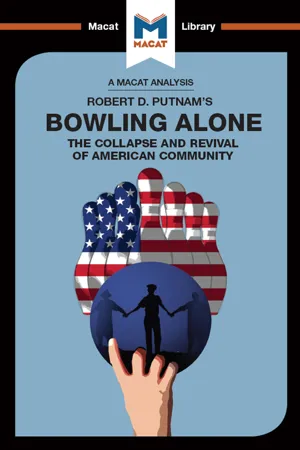
- 95 pages
- English
- ePUB (mobile friendly)
- Available on iOS & Android
An Analysis of Robert D. Putnam's Bowling Alone
About this book
American political scientist Robert Putnam wasn't the first person to recognize that social capital – the relationships between people that allow communities to function well – is the grease that oils the wheels of society. But by publishing Bowling Alone, he moved the debate from one primarily concerned with family and individual relationships one that studied the social capital generated by people's engagement with the civic life.
Putnam drew heavily on the critical thinking skill of interpretation in shaping his work. He took fresh looks at the meaning of evidence that other scholars had made too many assumptions about, and was scrupulous in clarifying what his evidence was really saying. He found that strong social capital has the power to boost health, lower unemployment, and improve life in major ways. As such, any decrease in civic engagement could create serious consequences for society.
Putnam's interpretation of these issues led him to the understanding that if America is to thrive, its citizens must connect.
Frequently asked questions
- Essential is ideal for learners and professionals who enjoy exploring a wide range of subjects. Access the Essential Library with 800,000+ trusted titles and best-sellers across business, personal growth, and the humanities. Includes unlimited reading time and Standard Read Aloud voice.
- Complete: Perfect for advanced learners and researchers needing full, unrestricted access. Unlock 1.4M+ books across hundreds of subjects, including academic and specialized titles. The Complete Plan also includes advanced features like Premium Read Aloud and Research Assistant.
Please note we cannot support devices running on iOS 13 and Android 7 or earlier. Learn more about using the app.
Information
Table of contents
- Cover
- Title Page
- Copyright Page
- Table of Contents
- WAYS IN TO THE TEXT
- SECTION 1: INFLUENCES
- SECTION 2: IDEAS
- SECTION 3: IMPACT
- Glossary of Terms
- People Mentioned in the Text
- Works Cited